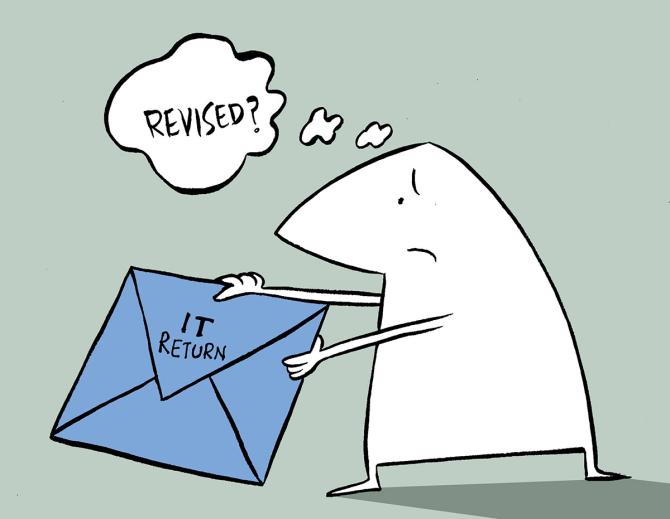Through a revised return, you can make changes to your ITR and even end up paying lower tax.

Filing one's income-tax return (ITR) is a matter of utmost importance.
Despite exercising diligence while filing returns, there's always the possibility of making a mistake or inadvertently providing incorrect information.
Fortunately, the Income-Tax (I-T) department offers taxpayers a chance to rectify such errors by filing a revised return under Section 139 (5) of the I-T Act, 1961.
Says Maneet Pal Singh, partner, I.P. Pasricha & Co., "The revised return substitutes the original return."
Who can file?
Any individual or entity that has filed an original ITR and subsequently discovers errors or omissions in the initial filing is eligible to file a revised return.
Says Pallav Pradyumn Narang, partner, CNK, "A revised return can be filed within three months before the end of the relevant assessment year or before the completion of the assessment, whichever is earlier."
The deadline for filing the revised return for the financial year 2022-2023 (assessment year 2023-2024) would be December 31, 2023, provided the assessment of the original return has not been completed before that date.
The Finance Act, 2021 amended the timeframe for filing a revised return.
Says Pratyush Miglani, managing partner, MVAC Advocates & Consultants, "Earlier, taxpayers had the option to file the revised return before the end of the assessment year or before the completion of the assessment, whichever was earlier."
Narang points out that there is no cap on the number of times that a taxpayer can file a revised return.
File it right away
If you've realised the need to revise your ITR, take the initiative and do so right away. Don't wait for the tax department to send you a scrutiny assessment under Section 143 (3).
The recent news of the I-T department issuing 100,000 tax notices to taxpayers serves as a reminder of the importance of being proactive.
The I-T department levies no penalty or charge if a taxpayer files a revised ITR. However, the taxpayer incurs a penalty if she fails to adhere to the deadline for filing a revised return.
Says Sandeep Bajaj, advocate, Supreme Court of India: "Missing the deadline will invite a late filing penalty of Rs. 5,000 under Section 234F of the I-T Act, 1961. However, if the income tax amount does not exceed Rs 5 lakh, only Rs 1,000 is levied as penalty."
Avoid multiple revisions
If a taxpayer becomes aware of additional information after filing the return, it can be included in the revised return.
Says Bajaj, "Revision of the original ITR is only allowed if the omission was not intentional. It does not apply to cases involving concealment or false statements."
Be careful while filing a revised return to avoid further mistakes.
Says Narang, "Multiple revisions, though legal, can attract scrutiny from tax officers. This is especially relevant in cases where there are significant revisions to returns."
Bajaj adds that any intentional omissions in a revised return may lead to penalties or fines.
Says Miglani, "When filing a revised return, provide a clear explanation for why the changes were made. Keep supporting documents handy for a smooth and compliant process."
Also make sure that you use the correct form when filing the revised return.
The due date for filing the original return was July 31, 2023.
Says Bajaj: "Note that a belated return, which is filed after the deadline, cannot be revised."
Many think that they can file an updated return instead of a revised return.
An updated return can now be filed under Section 139 of the Finance Act 2022 under subsection (8A).
Anyone can file an updated return, regardless of whether they have already filed the original, belated, or revised return (subject to certain conditions). However, there may be a hefty penalty for filing an updated return.
Moreover, through a revised return, you can make changes to your ITR and even end up paying a lower tax.
You can't do so through an updated return. It can only be filed if the taxpayer has to disclose additional income that was missed earlier, and which results in her/his paying additional tax.
Hence, file a revised ITR while you have the opportunity.

Feature Presentation: Ashish Narsale/Rediff.com











